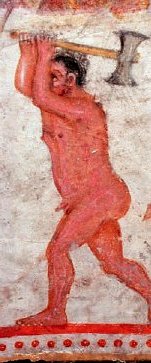|
Zalmoxis
Zalmoxis ( grc-gre, Ζάλμοξις) also known as Salmoxis (Σάλμοξις), Zalmoxes (Ζάλμοξες), Zamolxis (Ζάμολξις), Samolxis (Σάμολξις), Zamolxes (Ζάμολξες), or Zamolxe (Ζάμολξε) is a divinity of the Getae and Dacians (a people of the lower Danube), mentioned by Herodotus in his ''Histories'' Book IV, 93–96, written before 425 BC.http://classics.mit.edu/Herodotus/history.mb.txt According to Jordanes' ''Getica'', he was a learned philosopher, before whom two other learned men existed, by the names of Zeuta and Deceneus. In modern times, theories and debate on Zalmoxis's religion by such scholars as Mircea Eliade are influenced by considerations of Romanian nationalism as well by pure historical interest. Herodotus Herodotus writes about Zalmoxis in book 4 of his ''Histories'': 93. ... the Getae are the bravest of the Thracians and the most just. 94. They believe they are immortal forever living in the following sense: they thin ... [...More Info...] [...Related Items...] OR: [Wikipedia] [Google] [Baidu] |
Dacians
The Dacians (; la, Daci ; grc-gre, Δάκοι, Δάοι, Δάκαι) were the ancient Indo-European inhabitants of the cultural region of Dacia, located in the area near the Carpathian Mountains and west of the Black Sea. They are often considered a subgroup of the Thracians. This area includes mainly the present-day countries of Romania and Moldova, as well as parts of Ukraine, Moravian Banovina, Eastern Serbia, Northern Bulgaria, Slovakia, Hungary and Southern Poland. The Dacians and the related Getae spoke the Dacian language, which has a debated relationship with the neighbouring Thracian language and may be a subgroup of it. Dacians were somewhat culturally influenced by the neighbouring Scythians and by the Celtic invasion of the Balkans, Celtic invaders of the 4th century BC. Name and etymology Name The Dacians were known as ''Geta'' (plural ''Getae'') in Ancient Greek writings, and as ''Dacus'' (plural ''Daci'') or ''Getae'' in Roman Empire, Roman documents, b ... [...More Info...] [...Related Items...] OR: [Wikipedia] [Google] [Baidu] |

